080619_YKBP_A7.pdf






Broadcaster Press 7
August 6, 2019 www.broadcasteronline.com
How to Help Kids Make
Friends at School
The average student likely spends more
time at school and participating in extracurricular activities with classmates than he or
she does at home. In close proximity to so
many peers, it may seem like making friends
would be a snap. However, some students
have trouble connecting and can use a little
push to make friends.
The family and parenting resource Parenting Science notes that research indicates that
the most popular children are those who exemplify certain traits. These traits include being caring; a willingness to share; a willingness
to offer help; and strong verbal skills. Children
who embrace these traits may prove better at
making friends. Parents may find that youngsters need some encouragement to build their
social circles, and the following are some ways
parents can offer that encouragement.
• Encourage kids to seek out someone on
their own. It may be challenging to walk up
to a group and introduce yourself. Encourage
students to seek out someone who is alone
and then strike up a conversation, which can
be less intimidating than approaching a group.
Emphasize to kids that other students may
also be a little shy and looking to make friends.
• Practice conversation starters at home.
Children can work with their parents to come
up with topics that can help foster communication. These can include ice breakers and
common interests, such as favorite television
shows or video games.
• Teach kids approachable body language.
Wearing earbuds or exhibiting negative body
language, such as crossed arms or avoiding
eye contact, can make a person seem less approachable. Smiling, engaging in conversation
and being friendly can make it easier to make
friends.
• Ask teachers to help. The education
resource Understood says teachers can give
children responsibilities, such as the opportunity to hand out snacks or papers, which can
build confidence and provide opportunities
for kids to converse with their peers.
• Help children be active listeners. An
active listener is someone who makes it clear
that he or she is paying attention. Making
eye contact, orienting the body toward the
speaker and making relevant verbal responses
are some active listening strategies that can
help kids more fully engage with their peers.
Feeling valued and listened to may encourage other children to be more friendly and
engaging.
• Ask open questions. The social networking advisement site Young Scot suggests
having students ask open questions, such as:
“How was your summer?” or “What sports do
you like to play?” These types of questions can
kick-start in-depth conversations.
• Join a team or club. Students often make
friends in social or extracurricular settings,
such as on a sports team. With a shared interest, it’s easy to find topics to discuss.
Making friends in school can make time
spent in the classroom more enjoyable for
youngsters.
Metro Creative Connection
Popular Classroom
Learning Apps
It is impossible to ignore the immense
popularity of digital learning tools in today’s
schools. Teachers routinely turn to online
tools and available applications to offer students all the resources they need to become
well-rounded individuals.
According to research from Grunwald Associates, LLC, 71 percent of parents embrace
mobile devices and feel they open up learning opportunities for kids that didn’t previously exist. The research also suggests that
a similar percentage of parents would like
teachers to recommend apps for students.
Navigating learning apps can be daunting
due to the sheer volume of apps available.
According to Apps for Education, there
are more than 500,000 educational apps
currently available for download. Apps can
be stimulating and fun, but finding quality resources may involve sorting through
those that aren’t necessarily valuable. The
following are some apps parents may want to
consider.
• Memrise: Learning a second or third
language can be a boon to students of any
age. Some schools may be limited in the
number of languages they offer. Therefore,
an app may be a great resource for students
looking to learn a new language. Memrise
drills students on vocabulary, phrases, aural
recognition, and more.
• Kahoot: Kahoot is a platform to create
games and review content. Players answer
questions on their individual devices, while
games are displayed on a shared screen.
Kahoot can be an ideal way for several students to prepare for a test in a digital study
session.
• Reading Eggs: This comprehensive
learning system covers essential components of reading: awareness, vocabulary,
phonics, fluency, and comprehension.
Parents can see progress reports and know if
and where extra attention may be necessary.
• Edmodo: This app is designed to
streamline workloads for teachers and help
make it easier for them to stay connected
with the classroom and their students. Parents can set up accounts and stay abreast of
their children’s activities, grades, messages,
and progress. Though it’s not a learning app,
Edmodo can be a valuable tool for classroom
management.
• Epic: This online children’s subscription
book service offers immediate, on-demand
access to high-quality reading materials for
children ages 12 and under. Voracious readers will always have content they can access,
in addition to audio books, educational
videos, and educational quizzes.
• Photomath: This app enables students
to snap pictures of complicated math problems and get step-by-step directions on how
to answer them. Instead of simply giving the
answer, Photomath provides students with
the tools to answer the problems on their
own.
• StudyBlue: Students can create and
share mobile flash cards, study guides, quizzes, and choose from other study materials
to help reinforce lessons.
Educational apps play a vital role in educating today’s students.
Metro Creative Connection
Tried-and-True Ways to
Raise a Confident Kid
Fall Registration and Open House
Preschool through 5th grade is on
Wednesday, August 14th • 4:30 - 7:00 p.m.
Registration will take place in the gym and the
open house will be in the classrooms.
Please come, even if you are pre-registered.
Classes Begin:
Wednesday, August 21st, 2019 at 8:20 a.m.
The Catholic Daughters Ice Cream Social
will also be in the gym on Tuesday, August 14th
from 4:30-7:00pm. Open for everyone.
Contact: St. Agnes School, 909 Lewis Street, Vermillion, SD 57069 • 605.624.4144
in Vermillion
Serving Clay, Union, Turner Counties in South Dakota
(605) 624-5311
Hands are not
for hitting and
words were not
meant to be cruel
Children raised to be confident have the
tools to be resilient in a challenging world.
Confidence helps children handle peer pressure, stress, obstacles, and much more.
There’s a fine line between developing confidence and raising kids who are overly boastful. Parents, teachers and other influential
figures can employ various research-based
strategies to start boosting kids’ confidence.
• Allow children to make mistakes and
learn from them. Mistakes happen, and
children benefit from making mistakes and
learning from them. Children who fail, pick
themselves up and try again are learning lessons of resiliency. Their confidence develops
as they pick themselves up again, learn from
their mistake and ultimately meet with success.
• Resist the temptation to “fix” everything.
Parents may get hung up on trying to improve
on their children’s efforts to make it perfect.
This may occur with school work. According to the mental health wellness resource
Psychology Today, constant intervention undermines children’s confidence and prevents
them from learning for themselves.
• Model and teach positivity. It can be
easy to fall into a pattern of saying things
like, “I’ll never be able to do that” or “It’s too
difficult.” But parents must remember that
their children take their cues from mom and
dad. Parents who stay positive in the face of
adversity will instill the same attitude in their
children.
• Give praise when it’s deserved. Praise
children when they do their best, but avoid
praising kids when they don’t try their hardest or if they are still working toward solving
a problem they haven’t yet figured out. In lieu
of praise, provide encouragement and urge
youngsters to try again and practice.
• Value their ideas. Ask children for ageappropriate advice, suggests the growth
mindset company Big Life Journal. Showing
kids their ideas are worthy can instill confidence.
• Skip the rescue operation. Parents often
are quick to swoop in and try to prevent kids
from feeling hurt or discouraged. However,
according to Robert Brooks, PhD, who coauthored the book “Raising Resilient Children,”
it’s alright for kids to fail and feel sad or angry.
Success is learned by overcoming obstacles
rather than having all obstacles removed.
Above all, children who are loved and supported can develop confidence through the
years with some well-placed guidance.
GET YOUR
SPORTS PHYSICAL
Your athlete’s path to victory starts with a sports
physical at Sanford Vermillion. No matter which
sport, our expert physicians will make sure your
young athlete is fit and ready to play when the
whistle blows.
Schedule a sports physical today.
Call (605) 677-3500 to schedule an
appointment
018027-00532 Rev. 6/19
Metro Creative Connection

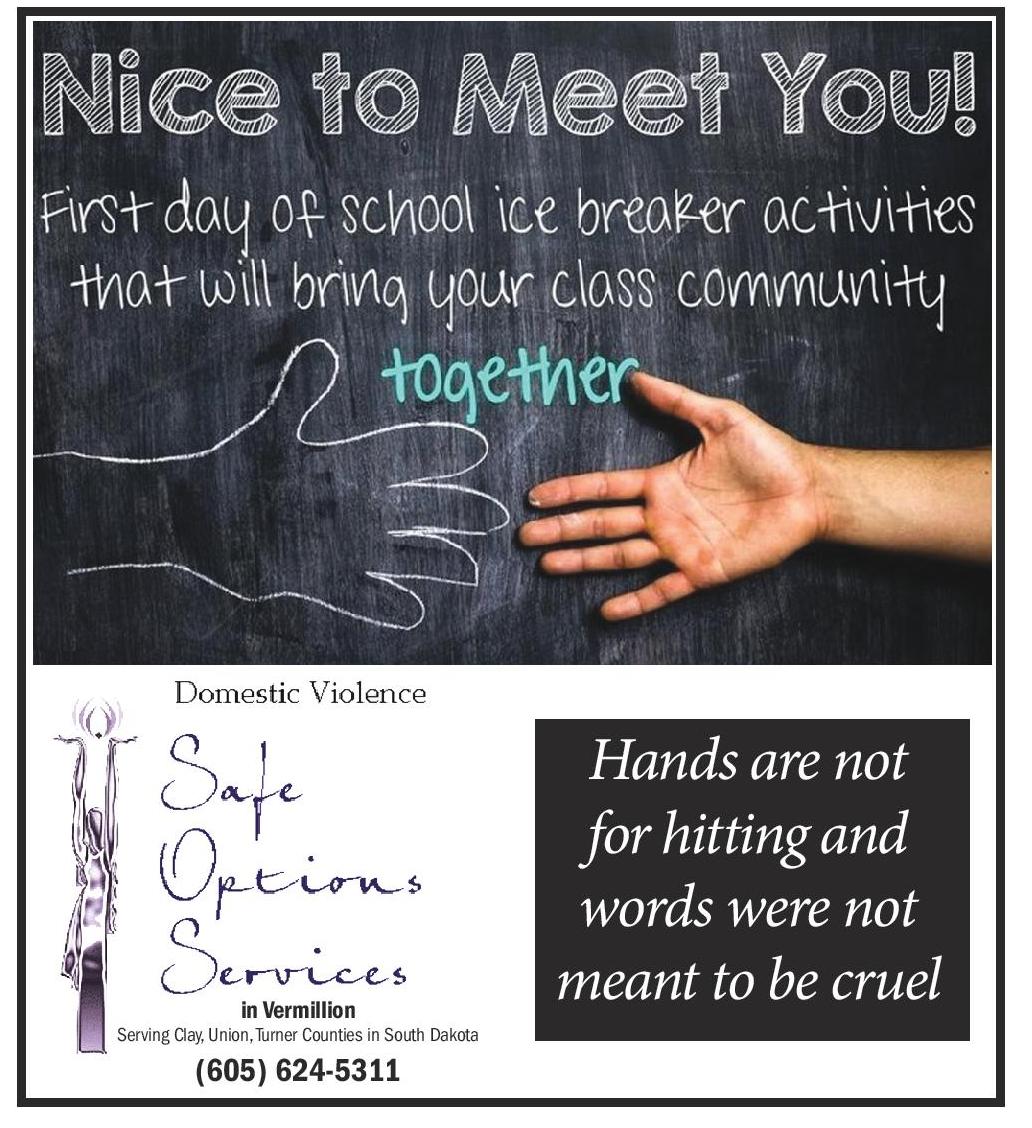

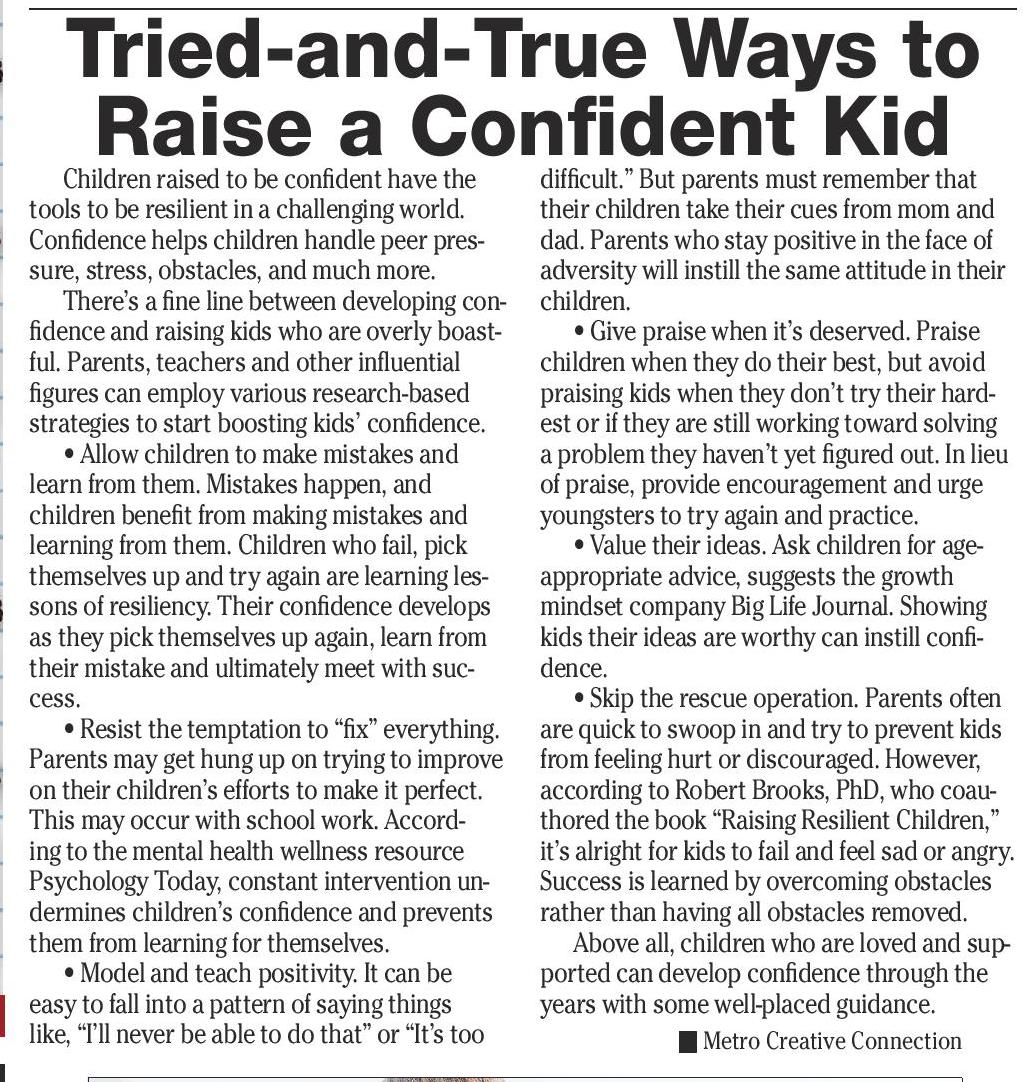
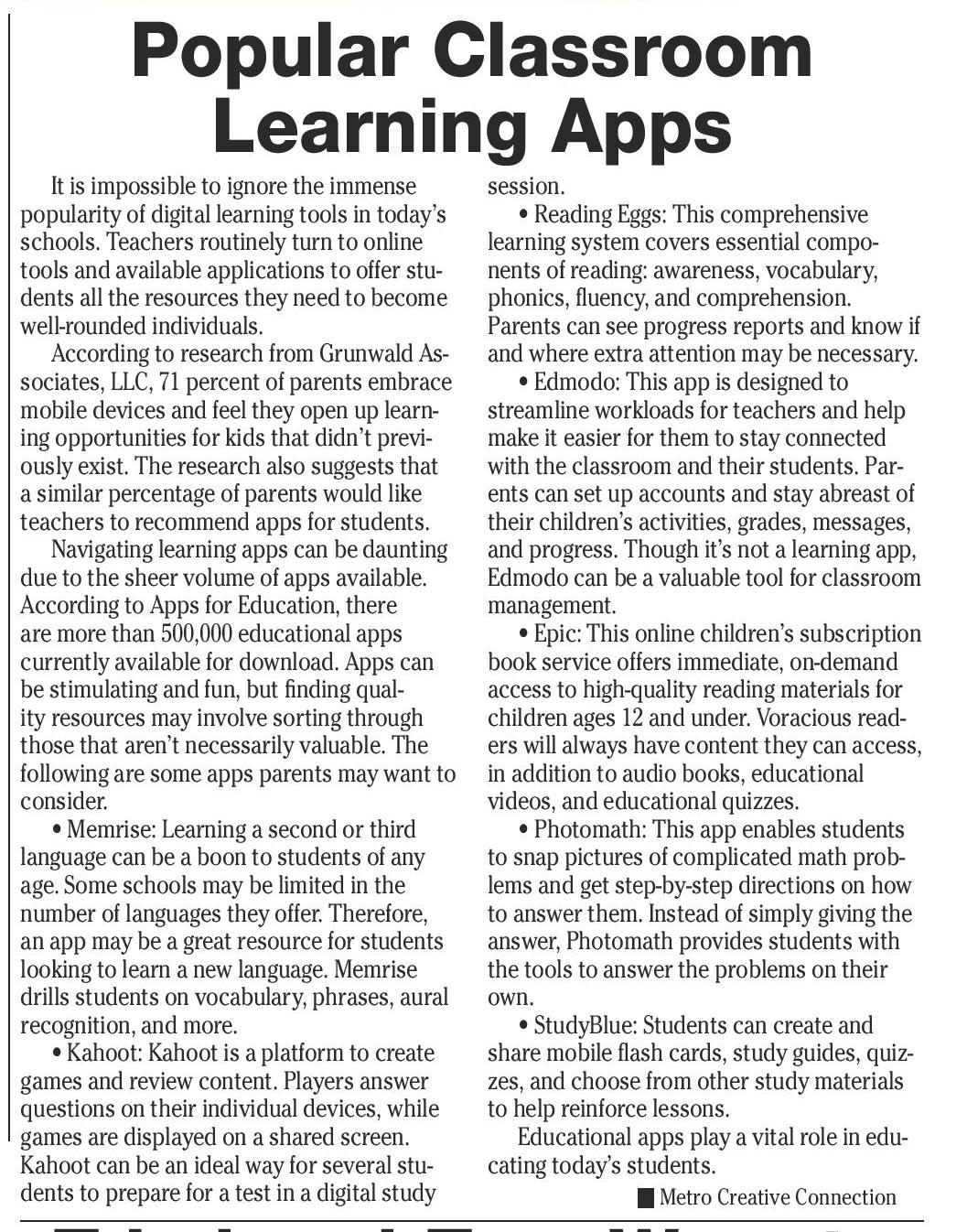
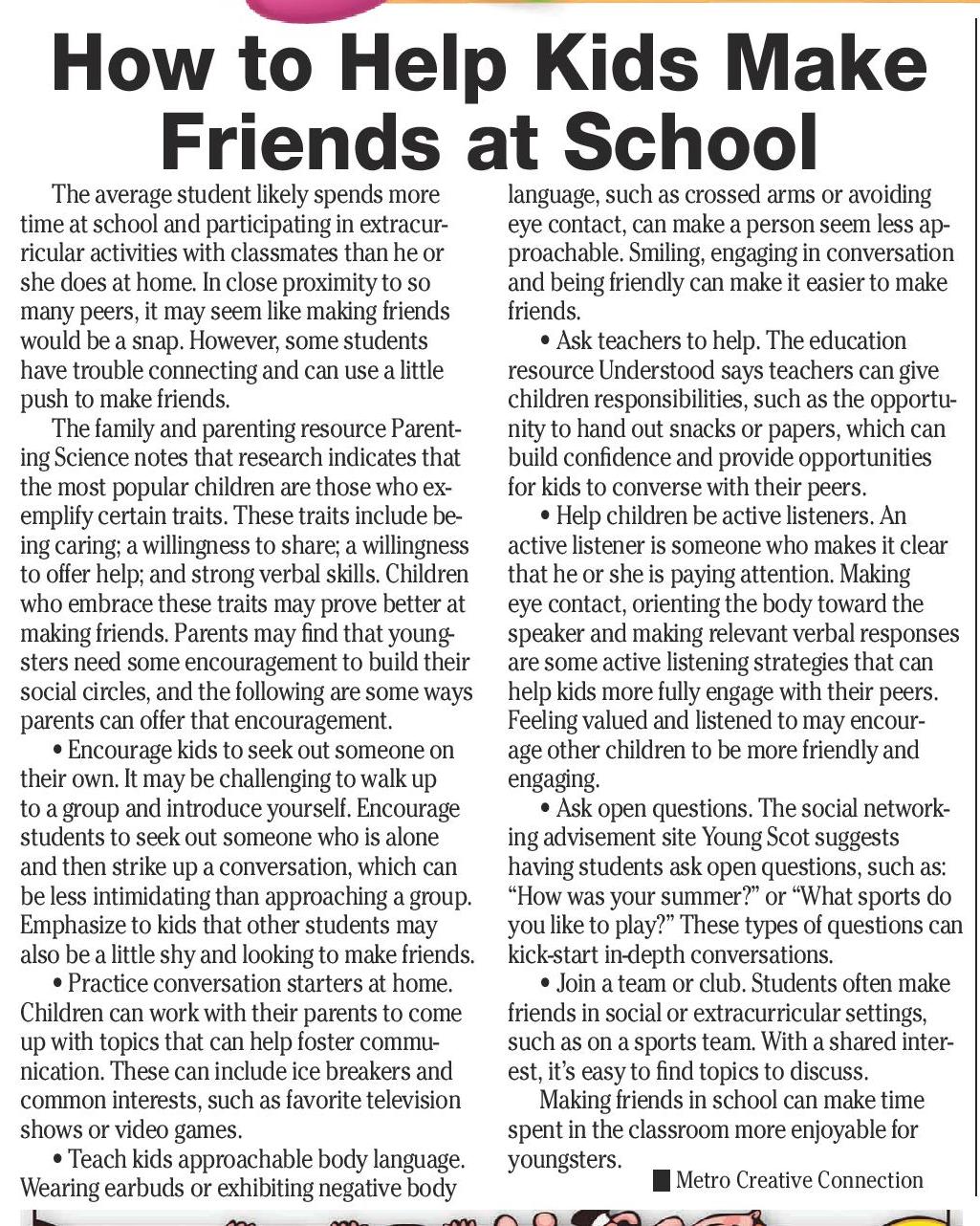







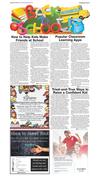







 Previous Page
Previous Page






